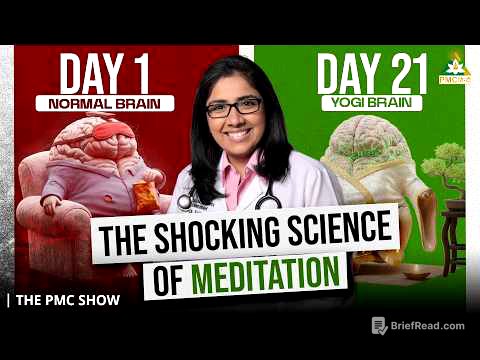TLDR;
This video features a discussion on integrative psychiatry and the role of nutrition in mental health. It clarifies the difference between integrated and integrative psychiatry, emphasizing the holistic approach of the latter. The speakers highlight the importance of gut health, functional nutrition, and lifestyle factors in addressing mental health issues, advocating for a comprehensive approach that may include medication, supplements, and lifestyle modifications.
- Integrative psychiatry takes a holistic approach, considering biological, psychological, and lifestyle factors.
- Functional nutrition focuses on identifying and addressing the root causes of health issues through diet and lifestyle changes.
- Gut health is crucial for mental health, with the gut-brain connection playing a significant role in mood and overall well-being.
Introduction to Integrative Psychiatry and Nutrition [0:00]
Dr. Nishi Bhopal introduces the concept of integrative psychiatry and its connection to nutrition for mental health. She is joined by Josh Habansky, an integrative psychiatric nurse practitioner, and Ailar Poormoghaddam, a certified clinical nutritionist. The team at Pacific Integrative Psychiatry focuses on treating adults with anxiety, depression, and sleep issues, incorporating nutrition services into their mental health care.
Integrated vs. Integrative Psychiatry [1:14]
Josh Habansky clarifies the difference between integrated and integrative psychiatry. Integrated psychiatry involves embedding psychiatric services within a primary care setting. Integrative psychiatry, on the other hand, takes a holistic approach to mental health, considering various factors such as neurotransmitters, hormones, nutrient deficiencies, food sensitivities, gut health, sleep quality, and spirituality.
Functional Nutrition and Gut Health [4:55]
Ailar Poormoghaddam explains functional nutrition, emphasizing its role in improving both physical and mental health by addressing gut health. Functional medicine digs deeper to find the root causes of chronic conditions, looking beyond just the symptoms. Nutrition is a core aspect, focusing on what and how people eat, and whether their diet consists of whole or processed foods.
Patient Struggles and Integrative Approaches [8:29]
Josh discusses the common issues patients face, including feeling down, anxiety, stress, physical health problems, sleep difficulties, and low energy. He emphasizes the importance of a thorough assessment, including medical, mental health, and family history, as well as current stressors and stress management practices. Comprehensive lab work is crucial to identify nutrient deficiencies and other imbalances.
The Role of Medication and Lifestyle Modifications [11:30]
The speakers address the misconception that integrative psychiatry is anti-medication. Medications can be life-saving, but they should be used as a tool alongside lifestyle modifications and nutrition. For motivated patients, lifestyle changes and improved nutrition can help reduce or discontinue medications.
Addressing Metabolic and Digestive Issues Through Nutrition [13:12]
Ailar discusses how she works with patients experiencing symptoms related to digestive and metabolic issues, such as bloating, gas, constipation, diarrhea, and difficulty focusing. She uses questionnaires and diet recalls to assess patients' eating habits and identify areas for improvement. Explaining the gut-brain connection helps patients understand why dietary changes are necessary.
Realistic Goal Setting and Hydration [18:21]
Ailar emphasizes the importance of setting realistic goals based on a patient's lifestyle and schedule. She uses the example of hydration, noting that it's more effective to gradually increase water intake rather than making drastic changes.
The Sympathetic Nervous System and Digestion [20:02]
Josh discusses the impact of the sympathetic nervous system (fight or flight response) on digestion. When people are stressed or rushing, they don't enter the parasympathetic state (rest and digest), which is necessary for proper digestion and absorption. He recommends taking three deep breaths before each meal and eating without distractions.
Mindful Eating and Practical Tips [23:43]
Ailar and Josh discuss the importance of mindful eating, focusing on how and when we eat, not just what we eat. Ailar suggests sitting for a few minutes after eating to allow the digestive system to function properly. She also recommends eating with the non-dominant hand to slow down the eating process.
Conclusion and Integrative Care Team Approach [27:36]
Dr. Bhopal concludes the discussion, highlighting the unique integrative care team approach at Pacific Integrative Psychiatry. Josh and Ailar work with adults in California, addressing anxiety, depression, sleep issues, and nutrition. Patients can see both practitioners for a comprehensive and integrative approach to mental health care.









